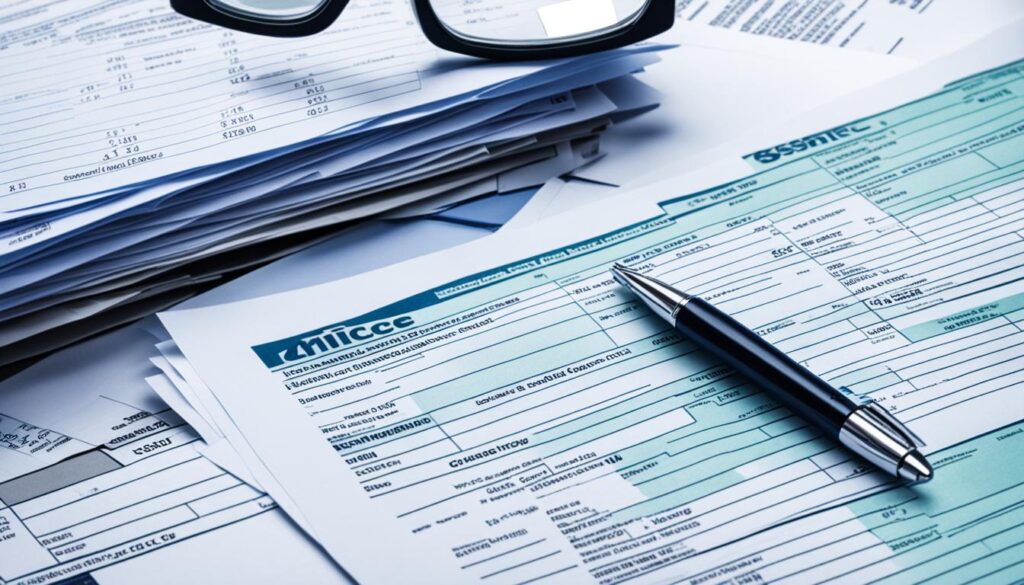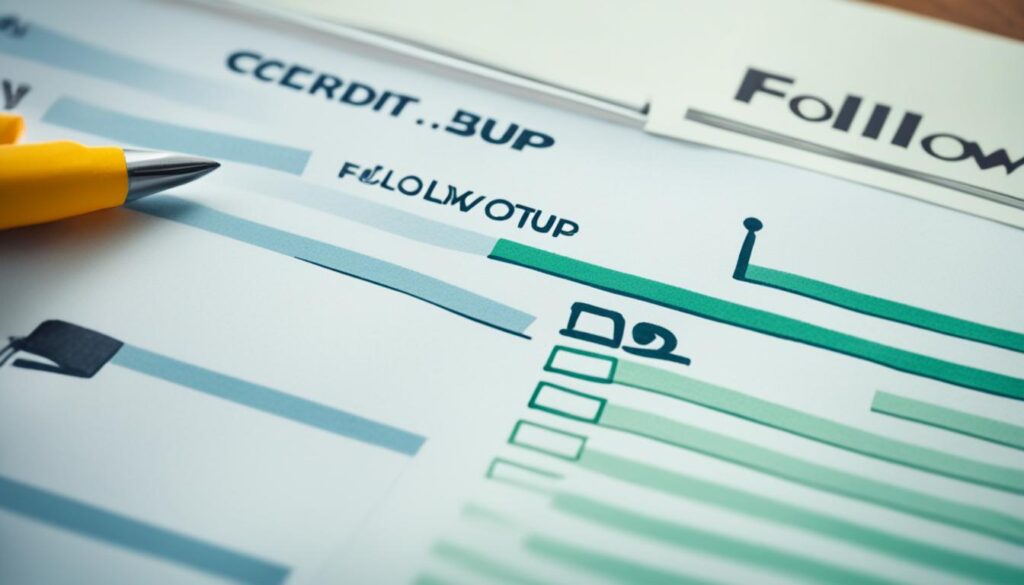Credit report disputes can be tricky, but they’re vital for your financial health. Knowing how to handle these disputes is crucial. This guide provides expert advice on fixing credit report errors effectively.
Credit reports affect loan approvals and interest rates. Errors can have serious impacts on your finances. It’s essential to spot and fix these mistakes quickly.
With the right approach, you can successfully dispute inaccuracies and boost your credit standing. This can lead to better financial opportunities.
Key Takeaways
- Regular credit report checks are essential for catching errors
- Understanding your rights under the Fair Credit Reporting Act is crucial
- Proper documentation strengthens your dispute case
- Clear communication with credit bureaus and creditors is key
- Persistence may be necessary if initial disputes are rejected
- Successful disputes can lead to significant credit score improvements
Understanding Credit Reports and Their Importance
Credit reports are vital for your financial life. They show your credit history and affect many parts of your daily life. Let’s explore credit reports and why they matter.
What is a credit report?
A credit report is a record of your credit history. It includes info about your accounts, payments, and public records. Credit bureaus make these reports using data from lenders and other sources.
The Fair Credit Reporting Act controls how this info is gathered and used.
Why your credit report matters
Your credit report affects many areas of your life. It can impact your ability to get loans and credit cards. It also influences interest rates and apartment rentals.
Even job hunting and insurance can be affected by your credit report.
- Get approved for loans and credit cards
- Secure favorable interest rates
- Rent an apartment
- Land a job
- Obtain insurance
Common credit report errors
Accurate credit reports are crucial, but mistakes can occur. Here are some common errors to watch for:
| Error Type | Description | Impact |
|---|---|---|
| Identity errors | Wrong name, address, or Social Security number | Potential identity mix-ups |
| Account status errors | Closed accounts listed as open | Inaccurate credit utilization ratio |
| Balance errors | Incorrect account balances | Misrepresentation of debt load |
| Data management errors | Same debt listed multiple times | Artificially inflated debt amount |
Knowing these details helps maintain a good credit profile. Check your report often and fix errors quickly. This can greatly improve your financial health.
Recognizing Errors in Your Credit Report
Spotting credit report errors is vital for effective credit repair. Mistakes in your report can harm your financial health. Learning to identify these errors is crucial for fixing them.
Common errors include incorrect personal info and accounts that aren’t yours. Outdated negative items can also appear. These mistakes can unfairly lower your credit score.
Review your report carefully line by line. Look for inaccurate payment histories, wrong account statuses, or duplicate entries. These are red flags needing immediate attention.
Free credit repair online resources can help you spot issues easily. They provide tools to identify common mistakes quickly.
- Check your personal details for accuracy
- Verify all listed accounts are yours
- Ensure negative items are within the legal reporting timeframe
- Compare balances and credit limits with your records
Mastering error recognition helps you dispute inaccuracies and improve your credit. Regular checks are key to maintaining a healthy credit profile.
“Knowledge is power. Knowing what to look for in your credit report empowers you to take control of your financial future.”
Stay alert and question any discrepancies you find. Your financial well-being depends on your credit report’s accuracy.
Your Rights Under the Fair Credit Reporting Act
The Fair Credit Reporting Act (FCRA) protects consumer credit rights. It ensures fairness and accuracy in credit reporting systems. Knowing your FCRA rights helps you manage your credit profile better.
Key Provisions of the FCRA
The FCRA gives consumers important rights. You can get a free credit report yearly from each major bureau. You’ll be told if your report is used against you.
You can dispute wrong or incomplete information. You can ask for its removal or correction.
How the FCRA Protects Consumers
The FCRA sets standards for credit reporting agencies. It limits who can see your credit report and why. Credit bureaus must investigate disputes within 30 days.
These rules keep your credit info safe. They also stop misuse of your data. How to Dispute Credit Report
Leveraging the FCRA in Disputes
Use FCRA rules when disputing credit report errors. Ask the bureau to check disputed info with the source. They must remove unverified information.
The full FCRA text explains your rights in detail. It shows how to use them effectively.
| FCRA Right | Consumer Benefit |
|---|---|
| Free annual credit report | Regular monitoring of credit information |
| Dispute inaccuracies | Maintain correct credit profile |
| Limit access to report | Protect privacy and prevent misuse |
Understanding FCRA rights helps you manage your credit profile well. You can fix credit report issues more easily. This knowledge is key to a good credit score.
Good credit helps your overall financial health. Learn more about credit solutions to improve your score.
Gathering Necessary Documentation for Your Dispute

Gathering the right documents is crucial for successful credit report disputes. Start by collecting relevant financial records. This includes bank statements, credit card bills, and loan documents. How to Dispute Credit Report
Next, gather any correspondence with creditors or debt collectors. Emails, letters, and phone call logs can be valuable evidence. Include copies of payments made, such as canceled checks or money order receipts.
For identity theft disputes, file a police report. This official document adds weight to your case. For personal information errors, have copies of your ID and proof of address ready.
Organize these documents neatly. Create a file for each dispute. This helps you manage multiple credit report disputes.
“Proper documentation is the foundation of successful credit repair. It’s not just about what you know, but what you can prove.”
The more evidence you have, the stronger your case. Thorough documentation boosts your chances of winning disputes. This approach can significantly improve your credit score.
How to Dispute Credit Report and Win: Step-by-Step Guide
Credit report errors can hurt your finances. This guide will help you win disputes and boost your score. Learning how to dispute credit report can improve your financial health. How to Dispute Credit Report
Identifying Errors to Dispute
Review your credit report carefully. Look for these common issues:
- Wrong personal info
- Accounts you didn’t open
- Late payments you made on time
- Incorrect balances
Drafting a Dispute Letter
Write a clear letter to the credit bureau. Include these key points:
- Your full name and address
- Each item you’re disputing
- Why it’s wrong
- Request for correction or removal
Keep your letter simple and factual. Avoid emotional language or threats.
Submitting Your Dispute to Credit Bureaus
Send your dispute by certified mail with return receipt. This helps track your case during investigations.
Include copies of supporting documents, not originals. Credit bureaus have 30 days to investigate and respond.
“A well-prepared dispute can significantly improve your chances of success.”
Stay patient and organized throughout the process. Follow up if needed to ensure your dispute is resolved.
With effort, you can clean up your credit report. This can lead to a brighter financial future.
Effective Strategies for Credit Bureau Investigations

Winning credit disputes requires smart strategies for credit bureau investigations. Focus on providing clear evidence and maintaining consistent communication. Gather all relevant documents that support your claim, like bank statements or payment records.
Be specific about the error when submitting your dispute. Include copies of supporting documents to help credit bureaus conduct thorough investigations. Keep copies of everything you send and use certified mail for tracking.
Follow up regularly on your dispute’s status. Credit bureaus have 30 days to investigate, but staying proactive can speed things up. Don’t hesitate to contact them for updates if you don’t hear back.
Consider using Consumer Law Dispute AI to streamline your dispute process. This tool can generate tailored dispute letters and guide you through the investigation.
- Be concise and factual in your communication
- Provide clear, organized evidence
- Follow up regularly on your dispute status
- Consider using AI tools for assistance
Implementing these strategies will boost your chances of success in credit bureau investigations. Stay persistent and informed throughout the process. This approach will help you protect your credit rights effectively.
Dealing with Creditors During the Dispute Process
Effective communication with creditors is crucial for successful credit disputes. You’ll need to engage with creditors directly when disputing errors. This process requires skill and strategy for the best results.
Communicating with Creditors
Be clear and concise when contacting creditors. State your reason and provide relevant details about the dispute. Keep your tone professional and courteous, even if you’re frustrated.
Effective communication is a vital credit repair strategy. It can make a significant difference in resolving issues with creditors.
Negotiating with Creditors
Strong negotiation skills can help resolve disputes. Be ready to discuss your case and offer solutions. Present any evidence supporting your claim confidently.
Don’t hesitate to ask questions about points you don’t understand. Seeking clarification shows you’re engaged and serious about resolving the issue.
Documenting All Interactions
Keeping detailed records is essential for winning credit disputes. Document every phone call, email, and letter exchanged with creditors. Note the date, time, and name of the person you spoke with.
This information can be crucial if you need to escalate your dispute later. It provides a clear trail of your efforts to resolve the issue.
| Communication Method | Pros | Cons |
|---|---|---|
| Phone Call | Immediate response, can clarify issues quickly | No written record unless you take notes |
| Written record, can attach documents | May take longer to get a response | |
| Certified Mail | Proof of receipt, formal documentation | Slower process, more effort required |
Mastering these aspects of dealing with creditors will improve your dispute process. You’ll be better equipped to navigate challenges and increase your chances of success.
Timeline Expectations: From Dispute to Resolution

Credit report disputes typically take 30 days for bureaus to investigate and respond. The clock starts ticking when they receive your dispute. Bureaus usually contact information providers within 5 business days.
Here’s a general timeline for credit report disputes:
- Day 1-5: Credit bureau receives and processes your dispute
- Day 5-25: Investigation period
- Day 25-30: Results compilation and notification
You’ll get a free updated copy if changes are made. Follow up if you don’t hear back within 45 days. Keep detailed records of all communications. how to dispute credit report and win
Complex disputes may take longer to resolve. The bureau might extend the investigation if new information surfaces. Stay proactive and patient for the best outcome.
What to Do If Your Dispute is Rejected
A rejected credit dispute can be disheartening. But don’t worry! You have rights and options to keep fighting for accurate credit reporting.
Your journey to win credit disputes isn’t over. As a consumer, you can take steps to protect your credit rights.
If your initial dispute is rejected, take these steps to protect your consumer credit rights:
- Review the rejection reason carefully
- Gather additional supporting evidence
- File a new dispute with more detailed information
- Consider contacting the creditor directly
- Seek help from a credit repair professional
Don’t give up if your first try fails. Many people fix errors after multiple attempts. Stay determined and keep fighting for your rights. how to dispute credit report and win
“Credit report disputes are a process, not a one-time event. Stay determined and keep advocating for your rights.” how to dispute credit report and win
If credit bureaus aren’t helping, try these other options:
| Action | Description | Potential Outcome |
|---|---|---|
| File a complaint with the CFPB | Submit your case to the Consumer Financial Protection Bureau | Agency intervention and resolution |
| Seek legal counsel | Consult with a consumer rights attorney | Possible lawsuit against bureaus or creditors |
| Add a consumer statement | Include a brief explanation in your credit report | Provides context for future creditors |
Keep pushing for a fair credit report. Your persistence can lead to success. Stay informed about your rights and options. How to Dispute Credit Report
Improving Your Credit Score After Successful Disputes
After winning credit report disputes, it’s time to boost your credit score. Keep a close eye on your credit report. Regular checks help catch new errors quickly.
Ensure your credit report accuracy stays intact. Set up alerts with credit monitoring services. This will keep you informed about any changes.
Building a Strong Credit Foundation
Make all your payments on time to build positive credit history. This includes credit cards, loans, and utility bills. Consider using a secured credit card if you’re starting from scratch. how to dispute credit report and win
These cards help establish credit while minimizing risk. As you prove your reliability, your credit score will climb. how to dispute credit report and win
Smart Credit Habits for Long-Term Success
Keep your credit utilization low by using less than 30% of available credit. Pay more than the minimum on your credit cards each month. Avoid opening too many new accounts at once.
This can temporarily lower your score. By sticking to these habits, you’ll see steady progress in your credit health.

